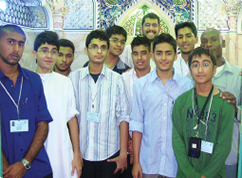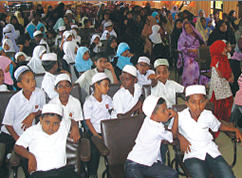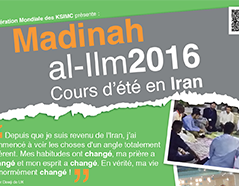BOOK REVIEW
Islamic Laws According to the fatwas of His Eminence al-Sayyid Ali al-Husayni al-Sistani
Volume One: Ritual Acts of Worship
A new annotated translation by Mohammed Ali Ismail
Published by The World Federation of KSI Muslim Communities (2015)

Since the first English translation of al-Sayyid Ali al-Husayni al-Sistani’s Tawdih al-Masa’il (literally, Explanation of Rulings ) was published by The World Federation in 1994, there have been a number of new rulings as well as changes to previous rulings. In light of this, and in response to the demands by many community members, The World Federation requested Shaykh Mohammed Ali Ismail to undertake the translation of the latest version of the Tawdih al-Masail. The present work is an annotated translation of the thirty-first edition, published in 2014 by the Qum office of al-Sayyid al-Sistani. Shaykh Mohammed Ali Ismail deserves to be commended for successfully completing this challenging task. May Allah SWT accept his endeavours and grant him increased tawfiqat .
Shaykh Mohammed Ali Ismail was born in Peterborough, U.K. After graduating in Law, he proceeded to study in the Hawza of Qum for ten years. Thereafter, he completed Post Graduate Studies in Education at the University of Portsmouth and went on to train Ministers of Religion at the Islamic Institute for Post Graduate Studies in Damascus. He is currently BA Hawza Studies Programme Leader and a lecturer and editor at the Islamic College in London. He has a number of publications to his name, including translations of Arabic and Persian works.
The translation of a scholarly work, especially a manual of jurisprudential rulings such as this compilation, is certainly no easy task. As the translator points out in his preface to the book, “The particular wording employed by a jurist in his fatwas is highly significant; sometimes, even small differences in expression can impact greatly on people’s lives.” With this in mind, he researched all of al-Sayyid al-Sistani’s other works on Islamic law in order to produce a precise translation and to add many helpful annotations and explanations; the work contains over 250 footnotes and over 600 glosses in square brackets.
In undertaking this translation, the translator has adopted eleven major conventions which are of critical importance to the integrity of the work. The conventions are included in the Translator's Preface and so readers can quickly acquaint themselves with the methodology and approaches used in the book.
There are many cross-references to other parts of the work, making it easy to find related rulings. In addition to both the transliteration and translation of all the various supplications and the other declarations that are pronounced in ritual acts of worship, the Arabic script of these statements is also included. This will assist readers to correctly recite all the Arabic parts.
Another useful feature is the inclusion of a comprehensive glossary of all the terms used in the book. Furthermore, there is a table of weights and measures that converts the system traditionally utilised in books of jurisprudence to the International System of Units. All this gives the feel that the book has ‘gone the extra mile’ to help readers better understand their duties.
This edition incorporates two completely new chapters: I ʿ tikaf (Spiritual Retreat) and al-Amr bil-M ’ aruf wa al-Nahy ‘ an al-Munkar (Enjoining Good and Forbidding Evil). These chapters provide essential guidance on these important areas and will certainly be appreciated by readers.
In addition, the following are some specific examples of new or changed rulings: taqlid – what to do when it not known who is the most learned among the mujtahid s or they are equal (Ruling 8); wiping of the feet in wudu’ (Ruling 251); method of performing al-ghusl al-tartibi (Ruling 360); the necessity of reciting the first verse of a surah and not sufficing with reciting bismillah on its own when performing the shorter method of salat al-ayat (Ruling 1487); and the things that invalidate a fast (Ruling 1551). There are many other examples.
Perhaps it would have been useful to have had all the chapters of the Tawdih al-Masail in one volume. This edition only covers ritual acts of worship ( ibadat ) and does not include the chapters on transactions ( mu’amalat ). Hopefully, the gap will be filled soon as the idea is to devote the second volume to those remaining chapters. I pray that Allah SWT blesses all those involved in this project to publish the second volume in the near future. I would also suggest that the work be made available in electronic format and placed on the internet.
In conclusion, this is a scholarly work that is not only written in clear English but adopts a new, user-friendly approach to understanding the rulings in the Tawdih al-Masa’il. I highly recommend it and commend Shaykh Mohammed Ali Ismail and the project team for producing so much more than another translation of al-Sayyid al-Sistani’s Tawdih al-Masa’il . The book will be of great benefit to the muqallidin of al-Sayyid al-Sistani and will be appreciated by all. A copy of this book is a must for all households, mosques, and madrasahs.
Sheikh Fazle Abbas Datoo
Resident Alim
Wessex Shia Ithna Asheri Jamaat
Related News
Updated 6 November 2013
The World Federation India Office and Mumbai Jamaat organised a workshop for the “Parents of the Youth” in Mumbai. This workshop was a part of 3 of the 4 workshops organised to cover all age groups from teens to the elders on the Theme of Family Ethics.










